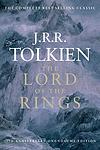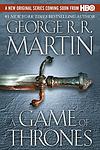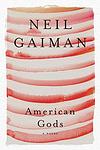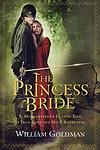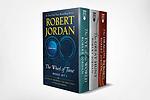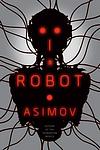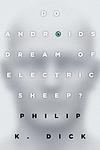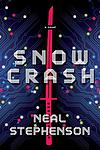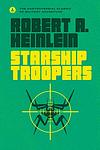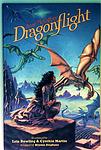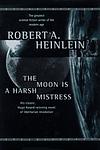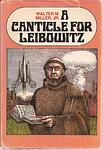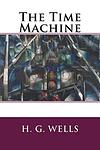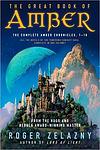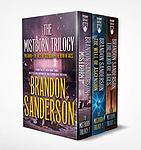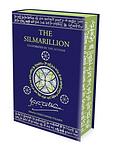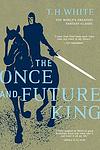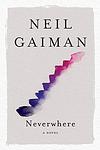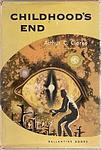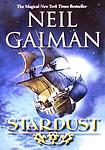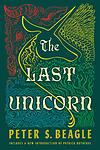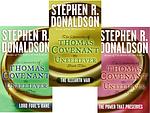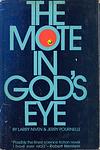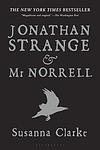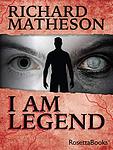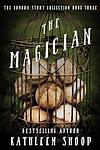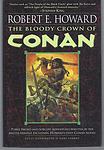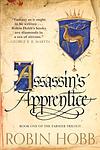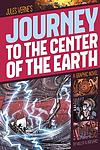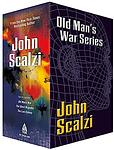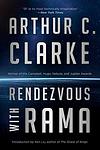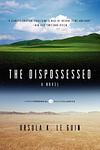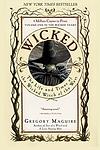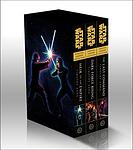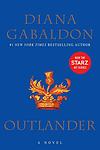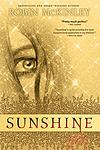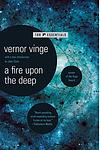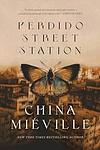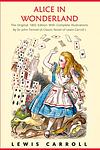Top 100 Science-Fiction, Fantasy Books
This is one of the 284 lists we use to generate our main The Greatest Books list.
-
The Lord of the Rings by J. R. R. Tolkien
This epic high-fantasy novel centers around a modest hobbit who is entrusted with the task of destroying a powerful ring that could enable the dark lord to conquer the world. Accompanied by a diverse group of companions, the hobbit embarks on a perilous journey across Middle-earth, battling evil forces and facing numerous challenges. The narrative, rich in mythology and complex themes of good versus evil, friendship, and heroism, has had a profound influence on the fantasy genre.
-
The Hitchhiker's Guide to the Galaxy by Douglas Adams
This comedic science fiction novel follows the intergalactic adventures of an unwitting human, Arthur Dent, who is rescued just before Earth's destruction by his friend Ford Prefect, a researcher for a galactic travel guide. Together, they hitch a ride on a stolen spaceship, encountering a range of bizarre characters, including a depressed robot and a two-headed ex-president of the galaxy. Through a series of satirical and absurd escapades, the book explores themes of existentialism, bureaucracy, and the absurdity of life, all while poking fun at the science fiction genre and offering witty commentary on the human condition.
-
Ender's Game by Orson Scott Card
A young prodigy is enlisted into a military academy in space, where he is trained through complex war games to combat an impending alien invasion. Despite his initial struggles with isolation and manipulation by the academy's leaders, he rises through the ranks due to his strategic genius and leadership skills. The protagonist grapples with the moral implications of war and the cost of his own humanity, as he is groomed to be the Earth's ultimate weapon against the alien threat.
-
Dune by Frank Herbert
Set in a distant future, the novel follows Paul Atreides, whose family assumes control of the desert planet Arrakis. As the only producer of a highly valuable resource, jurisdiction over Arrakis is contested among competing noble families. After Paul and his family are betrayed, the story explores themes of politics, religion, and man’s relationship to nature, as Paul leads a rebellion to restore his family's reign.
-
A Game of Thrones by George R. R. Martin
This epic fantasy novel is set in the Seven Kingdoms of Westeros, where 'summers span decades and winters can last a lifetime'. The story follows three main plot lines: the Stark family's struggle to control the North; the exiled Targaryen siblings' attempt to regain the throne; and the Night's Watch's fight against the supernatural beings beyond the Wall. As these stories intertwine, a game of power, politics, and survival unfolds, where you either win or you die.
-
Nineteen Eighty Four by George Orwell
Set in a dystopian future, the novel presents a society under the total control of a totalitarian regime, led by the omnipresent Big Brother. The protagonist, a low-ranking member of 'the Party', begins to question the regime and falls in love with a woman, an act of rebellion in a world where independent thought, dissent, and love are prohibited. The novel explores themes of surveillance, censorship, and the manipulation of truth.
-
Fahrenheit 451 by Ray Bradbury
In a dystopian future where books are banned and burned by the government to prevent dissenting ideas, a fireman named Guy Montag, whose job is to burn books, begins to question the society he serves. After a series of events, including meeting a free-thinking teenager and witnessing a woman choosing to die with her books, Montag begins to secretly collect and read books, leading to his eventual rebellion against the oppressive regime. The narrative serves as a critique of censorship, conformity, and the dangers of an illiterate society.
-
Foundation by Isaac Asimov
This science fiction novel centers around Hari Seldon, a mathematician who has developed a branch of mathematics known as psychohistory. With it, he can predict the future on a large scale. Seldon foresees the imminent fall of the Galactic Empire, which encompasses the entire Milky Way, and a dark age lasting 30,000 years before a second great empire arises. To shorten this period of barbarism, he creates two Foundations at opposite ends of the galaxy. The book follows the first few centuries of the Foundation's existence, focusing on the scientists as they develop new technologies and negotiate with neighboring planets.
-
Brave New World by Aldous Huxley
Set in a dystopian future, the novel explores a society where human beings are genetically bred and pharmaceutically conditioned to serve in a ruling order. The society is divided into five castes, each with its specific roles. The narrative follows a savage who rejects the norms of this new world order and struggles to navigate the clash between the values of his upbringing and the reality of this technologically advanced, emotionless society. His resistance prompts a deep examination of the nature of freedom, individuality, and happiness.
-
American Gods by Neil Gaiman
A recently released convict discovers that his wife and best friend died in a car accident. He then meets a mysterious stranger who hires him as a bodyguard. As they journey across America, it is revealed that the stranger is an old god, traveling to rally his fellow forgotten deities to wage a war against the new American gods born from society's modern obsessions with media, technology, drugs, celebrity, and more. The story blends elements of fantasy, mythology, and Americana to explore themes of faith, belief, and the nature of American identity.
-
The Princess Bride by William Goldman
This book is an illustrated edition of a classic tale of true love and high adventure. It tells the story of a beautiful princess and her one true love. After he is reportedly killed, she agrees to marry a wicked prince instead, only to be kidnapped and face numerous dangers. The story is filled with humor, romance, and swashbuckling action, all brought to life by vivid illustrations.
-
The Wheel of Time Series by Robert Jordan
The Wheel of Time series is a high fantasy saga that follows a group of friends from a small village as they are thrust into a world teeming with magic, political intrigue, and ancient prophecies. The main protagonist, a young man destined to be the reincarnation of a powerful figure who could either save or destroy the world, must navigate complex alliances, face dark forces, and learn to control his own burgeoning powers. The series is renowned for its detailed world-building, complex plotlines, and large cast of characters.
-
Animal Farm by George Orwell
"Animal Farm" is a satirical fable set on a farm where the animals revolt, overthrow their human farmer, and take over the running of the farm for themselves. The story is an allegory of the Russian Revolution and the rise of Stalin, and the tale is told by the animals that inhabit the farm, primarily pigs who become the ruling class. Despite their initial attempts at creating an equal society, corruption and power ultimately lead to a regime as oppressive as the one they overthrew.
-
Neuromancer by William Gibson
In this groundbreaking cyberpunk novel, a washed-up computer hacker is hired by a mysterious employer to pull off the ultimate hack. As he navigates a dystopian future filled with artificial intelligence, corporate espionage, and virtual reality, he must confront his own past and the dark realities of the digital world. The narrative explores themes of technology, identity, and consciousness, pushing the boundaries of science fiction literature.
-
Watchmen by Alan Moore
Set in an alternate history where superheroes emerged in the 1940s and 1980s, the story follows a group of retired superheroes who are brought out of retirement after the murder of one of their own. As they investigate, they uncover a plot that could change the course of history and the balance of world power. The book explores complex themes such as the morality of power, the definition of heroism, and the value of human life.
-
I, Robot by Isaac Asimov
The book is a collection of nine short stories that revolve around the interaction of humans and robots. The stories are tied together by a framing narrative featuring a reporter interviewing a retiring robopsychologist, Dr. Susan Calvin. The stories explore the three "Laws of Robotics" and how they are interpreted and manipulated by humans and robots. Throughout the stories, the robots often end up behaving in unexpected ways due to their interpretation of these laws, leading to thought-provoking and often ironic outcomes.
-
Stranger in a Strange Land by Robert A. Heinlein
The novel follows the life of Valentine Michael Smith, a human who was raised on Mars and returns to Earth in early adulthood. Smith struggles to understand human culture, norms, and conventions, while also possessing extraordinary psychic abilities. As he navigates Earth society, he begins to question many of its institutions and values, ultimately creating his own religion to pass on the wisdom he gained on Mars. The book explores themes of freedom, self-reliance, and the nature of humanity, and is considered a classic of science fiction literature.
-
The Name Of The Wind by Patrick Rothfuss
This fantasy novel follows the tale of a gifted young man who grows from a precocious child into a notorious wizard, known as the most notorious magician, musician, thief, and assassin. His life is one of hardship and danger, as he seeks knowledge and revenge following the tragic murder of his family by a group of supernatural beings. The story is told in retrospect as the protagonist recounts his past to a chronicler over the course of three days, revealing the truth behind the myths and legends that have come to surround his enigmatic persona.
-
Slaughterhouse-Five by Kurt Vonnegut
The novel follows the life of Billy Pilgrim, a World War II veteran who has become "unstuck in time," experiencing his life events out of order. This includes his experiences as a prisoner of war in Dresden during the Allies' firebombing, his post-war life as a successful optometrist, his abduction by aliens from the planet Tralfamadore, and his eventual death. The book is a critique of war and a demonstration of the destructive nature of time, with a nonlinear narrative that reflects the chaos and unpredictability of life.
-
Frankenstein by Mary Shelley
This classic novel tells the story of a young scientist who creates a grotesque but sentient creature in an unorthodox scientific experiment. The scientist, horrified by his creation, abandons it, leading the creature to seek revenge. The novel explores themes of ambition, responsibility, guilt, and the potential consequences of playing God.
-
Do Androids Dream of Electric Sheep? by Philip K. Dick
Set in a post-apocalyptic world, the novel presents a future where Earth's life has been greatly damaged by a nuclear global war, leaving most species extinct. The remaining human population has been encouraged to emigrate to off-world colonies to preserve the human race. Those who remain on Earth are tasked with maintaining the ecological balance by owning and caring for animals, replacing extinct species with mechanical replicas when necessary. The story revolves around a bounty hunter, who is tasked with "retiring" rogue androids that pose a threat to humans, and his emotional and moral struggles as he goes about his work.
-
The Handmaid's Tale by Margaret Atwood
Set in a dystopian future, this novel presents a society where women are stripped of their rights and are classified into various roles based on their fertility and societal status. The protagonist is a handmaid, a class of women used solely for their reproductive capabilities by the ruling class. The story is a chilling exploration of the extreme end of misogyny, where women are reduced to their biological functions, and a critique of religious fundamentalism.
-
The Gunslinger by Stephen King
In a desolate and archaic world that mirrors the Old West, a stoic and enigmatic gunslinger embarks on a relentless quest across a desolate landscape to find the mysterious figure known as the Man in Black. Along his journey, he encounters strange characters, reflects on his troubled past, and confronts both physical and metaphysical challenges. His ultimate goal is to reach the elusive Dark Tower, a place that is said to be the nexus of all universes, where he believes he can right the wrongs of his decaying world. The narrative blends elements of fantasy, horror, and Western genres, creating a unique and haunting tapestry that sets the stage for an epic series of interdimensional proportions.
-
2001: A Space Odyssey by Arthur C. Clarke
This science fiction novel follows a voyage to Jupiter with the sentient computer HAL after the discovery of a mysterious black monolith affecting human evolution. Dealing with themes of existentialism, human evolution, technology, artificial intelligence and extraterrestrial life, it is a journey of discovery that takes a dangerous turn when the onboard computer begins to malfunction. The story is a complex mix of science, philosophy, and conjecture.
-
The Stand by Stephen King
This post-apocalyptic horror/fantasy novel presents a world devastated by a deadly plague, killing 99% of the population. The survivors, drawn together by dreams of a charismatic and benevolent figure, gather in Boulder, Colorado to form a new society. However, a malevolent figure also emerges, attracting a following of his own and setting the stage for a classic battle between good and evil. The story delves into themes of community, morality, and the capacity for both destruction and regeneration within humanity.
-
Snow Crash by Neal Stephenson
In a future America where the federal government has largely collapsed and been replaced by corporate entities, a computer hacker and pizza delivery driver becomes embroiled in a plot involving a dangerous new drug and a computer virus called "Snow Crash". He is joined by a teenage skateboard courier and a host of other characters in a high-stakes race to uncover the truth behind the virus and its origins in ancient Sumerian culture. The narrative explores themes of linguistics, philosophy, computer science, religion, and cryptography.
-
The Martian Chronicles by Ray Bradbury
This science fiction novel is a collection of intertwined short stories that depict the colonization of Mars by humans fleeing from a troubled Earth, and the conflict between aboriginal Martians and the new colonists. The book delves into issues such as nuclear war, racism, and censorship. As the human settlers arrive and begin to shape the Martian landscape to their needs, they face a series of strange and haunting encounters with the Martian civilization, leading to unexpected and often tragic outcomes.
-
Cat's Cradle by Kurt Vonnegut
This novel is a satirical commentary on modern man and his madness, exploring issues of science, technology, and religion. The story revolves around a narrator who becomes involved with the children of a deceased scientist, who had developed a substance capable of freezing water at room temperature. This substance, if misused, has the potential to end all life on earth. The novel is filled with strange and twisted characters, and culminates in a cataclysmic event, highlighting the dangers of uncontrolled technological advancement.
-
Sandman by Neil Gaiman
"Sandman" is a dark and fantastical series that follows the character Dream, also known as Morpheus, one of the seven Endless who personify certain universal concepts that transcend beyond gods. The narrative explores Dream's realm and responsibilities, his interactions with humans, gods, and his own family, as well as the consequences when he is captured and subsequently escapes after 70 years. The series is renowned for its blending of myth, history, and contemporary issues, creating a richly nuanced universe that delves into the nature of storytelling itself.
-
A Clockwork Orange by Anthony Burgess
This novel follows the life of a violent young man named Alex, who is part of a youth subculture in a dystopian future England. Alex and his gang engage in a nightmarish spree of rape, assault, and robbery, until he is arrested and subjected to a psychological experiment by the government to "cure" him of his violent tendencies. The novel explores themes of free will, morality, and the nature of evil, while using a unique slang language invented by the author.
-
Starship Troopers by Robert A. Heinlein
The book is a military science fiction novel set in the future, where humanity is engaged in an interstellar war against an alien species known as the Arachnids or "Bugs." It follows the story of Juan "Johnny" Rico, a young infantryman in the Mobile Infantry, a futuristic military unit equipped with powered armor suits. The narrative delves into Rico's experiences and growth from a naïve recruit to a seasoned officer, exploring themes of citizenship, duty, and the moral complexities of war. Through Rico's eyes, the novel examines the structure of a militaristic society where full citizenship and the right to vote are earned through military service, presenting a society that values sacrifice and responsibility in a perpetual struggle for survival against a hostile universe.
-
Watership Down by Richard Adams
This novel follows a group of rabbits as they flee their warren due to a foreseen catastrophe. The rabbits, led by Hazel and his psychic brother Fiver, face numerous challenges and adventures as they search for a new home. They encounter predators, hostile rabbit communities, and human threats. The book explores themes of leadership, survival, and freedom, all set within the natural world and its inherent dangers.
-
Dragonflight by Anne McCaffrey
In a world where telepathic dragons and their riders protect the land from the destructive Thread that rains down from the sky, a young woman unexpectedly becomes the new Weyrwoman, bonding with the last queen dragon. As the traditional ways of the past clash with the urgent need to defend their world, she and her enigmatic dragonrider ally must rediscover ancient secrets and take to the skies in a perilous quest to unite the dragonriders and save their planet from annihilation. Their journey is fraught with challenges, both political and personal, as they strive to harness the full power of the dragons and ensure the survival of their way of life.
-
The Moon is a Harsh Mistress by Robert A. Heinlein
In the late 21st century, the moon has become a penal colony where the inhabitants, known as "Loonies", live under harsh conditions and are exploited by the Earth's government. A supercomputer named Mike, a one-armed computer technician named Mannie, and a revolutionary named Wyoming Knott lead an uprising against the Earth's oppressive rule. With Mike's intelligence, Mannie's technical skills, and Wyoming's charisma, they successfully instigate a rebellion, navigating political intrigue, military strategy, and complex human relationships along the way.
-
A Canticle for Leibowitz by Walter M. Miller
"A Canticle for Leibowitz" is a post-apocalyptic science fiction novel that explores the cyclical nature of history through the lens of a Catholic monastery in the American Southwest. After a devastating nuclear war, the monks of the Albertian Order of Leibowitz work to preserve the remnants of mankind's scientific knowledge until the world is again ready for it. Over the course of centuries, civilization rises and falls, wars are fought, and scientific advancements are rediscovered and then lost again. The novel is a poignant commentary on the potential for humanity to repeat its mistakes.
-
The Time Machine by H. G. Wells
A Victorian-era scientist invents a machine that allows him to travel through time. He first journeys to the year 802,701 A.D., where he encounters the Eloi, a society of small, elegant, childlike adults who live in harmony but lack curiosity and drive. He later discovers the Morlocks, a nocturnal, subterranean species who prey on the Eloi. After rescuing an Eloi named Weena, the protagonist loses his time machine and must devise a plan to recover it and return to his own time, all while exploring the social and evolutionary implications of the two distinct societies.
-
Twenty Thousand Leagues Under the Sea by Jules Verne
This classic science fiction novel follows the adventures of Professor Aronnax, his servant Conseil, and harpooner Ned Land as they are captured by the enigmatic Captain Nemo aboard the Nautilus, a technologically advanced submarine. As they journey 20,000 leagues under the sea, they encounter a variety of sea creatures and underwater phenomena. The narrative explores themes of exploration, scientific discovery, and man's relationship with nature.
-
Flowers for Algernon by Daniel Keyes
The book is a poignant science fiction narrative that follows the life of Charlie Gordon, a man with an IQ of 68, who undergoes an experimental surgical procedure intended to increase his intelligence. The story is told through Charlie's progress reports, which initially showcase his limited comprehension and writing ability. As the treatment takes effect, Charlie's intelligence surpasses that of the average person, leading to a dramatic increase in his understanding of the world, relationships, and his own past. However, the transformation is not without its pitfalls, as Charlie grapples with the emotional and social implications of his newfound abilities, and the impermanence of the experiment's success becomes a haunting reality. The novel explores themes of intellect, human dignity, and the ethics of scientific experimentation.
-
War of the Worlds by H. G. Wells
This classic science fiction novel tells the story of a Martian invasion of Earth, as experienced by an unnamed protagonist and his brother. The Martians, who are technologically far superior to humans, cause widespread devastation with their heat-ray weapons and towering tripods. Despite humanity's best efforts to resist, they seem unstoppable. The novel is a commentary on British imperialism and explores themes of human survival and evolution.
-
The Chronicles Of Amber by Roger Zelazny
The series unfolds the complex tale of a royal family from Amber, the only true world, with the rest of reality being mere shadows of it. The protagonist, suffering from amnesia, discovers his identity as a prince of Amber and becomes embroiled in intricate family politics, magical battles, and the manipulation of different realities. As he regains his memory and navigates the treacherous landscapes of Amber and its shadow worlds, he uncovers dark secrets about his family and the nature of their universe, all while contending with the machinations of his ambitious siblings who vie for the throne of Amber.
-
The Belgariad by David Eddings
The series follows the journey of a young farm boy who discovers his extraordinary destiny as the heir to a powerful artifact that must be retrieved to prevent a dark god from dominating the world. Raised in a rural village, he is initially unaware of his royal lineage and the prophecy that foretells his role in an epic battle between good and evil. As he travels across diverse lands with a group of companions, including a wise old sorcerer, a fierce knight, a cunning thief, and a beautiful princess, he learns about his true heritage and the magical powers he possesses. Together, they face numerous challenges and adversaries, all while the fate of the world hangs in the balance, culminating in a climactic confrontation with the forces of darkness.
-
The Mists of Avalon by Marion Zimmer Bradley
This novel reimagines the Arthurian legends from the perspectives of the women involved. It centers around Morgaine, Arthur's half-sister, who is a priestess of Avalon, and Gwenhwyfar, Arthur's queen. The story explores their roles in the political and spiritual conflicts that arise as Christianity begins to replace the old pagan ways. It delves into themes of love, loyalty, and power, while offering a fresh take on a classic tale.
-
Mistborn by Brandon Sanderson
In a grim, ash-covered world ruled by the immortal Lord Ruler, a young street urchin discovers she possesses unique magical abilities—Allomancy, the power to ingest and burn metals to enhance physical and mental capabilities. She joins a group of rebel skaa, the oppressed class, led by a charismatic criminal mastermind, to overthrow the centuries-old tyranny. Together, they devise an elaborate heist to infiltrate the noble houses and spark a revolution, uncovering dark secrets and unexpected truths about their world and the origins of the Lord Ruler's power along the way.
-
Ringworld by Larry Niven
In this science fiction novel, a motley crew of explorers, including a 200-year-old human, a young woman with lucky genes, a cat-like alien, and a two-headed alien guide, embark on a journey to investigate an artificial ring orbiting a star. This colossal structure, known as the Ringworld, has the surface area of millions of Earths and harbors many mysteries. As the team explores the vast, enigmatic world, they encounter a variety of advanced technologies and alien species, while also grappling with the physics and dangers of the ring's environment. Their mission becomes a struggle for survival and a quest to uncover the origins and purpose of the Ringworld.
-
The Left Hand Of Darkness by Ursula K. Le Guin
The novel is a groundbreaking work of science fiction that explores themes of gender, politics, and identity. Set on a planet called Gethen, where the inhabitants are ambisexual, shifting between male and female, the story follows an envoy from Earth who struggles to understand this alien society. As he navigates the complex political landscape of Gethen, he must also grapple with his own preconceptions about gender and sexuality. The book is a profound exploration of difference, otherness, and what it means to be human.
-
The Silmarillion by J. R. R. Tolkien
The book is a collection of mythopoeic stories that form the prelude to a well-known fantasy saga, detailing the creation of the world and the history of its early ages. It encompasses the tragic tale of the quest for the titular jewels, which imbue their creators with great power and beauty. The narrative follows the rebellion of a group of elves against the gods, the subsequent wars and the downfall of noble houses, interwoven with themes of heroism, fate, and the struggle against the ultimate evil. The work is rich with languages, cultures, and epic poetry, setting the stage for the later adventures in the renowned fantasy realm.
-
The Once and Future King by T. H. White
This novel is a retelling of the Arthurian legend, from Arthur's childhood tutelage under the wizard Merlyn to his eventual death. The story follows Arthur's journey from a naive boy to a wise and just king, his establishment of the Round Table, his marriage to Guinevere, and his complex relationship with his illegitimate son, Mordred. The narrative explores themes of power, justice, war, and human nature, offering a nuanced and humanizing portrayal of a well-known mythical figure.
-
Neverwhere by Neil Gaiman
In this dark and imaginative fantasy, a young Londoner named Richard Mayhew finds his mundane life turned upside down when he stumbles upon a young woman named Door, bleeding on the sidewalk. After aiding her, he is thrust into the shadowy, parallel world of London Below, a realm of magic, danger, and intrigue that exists beneath the streets of London Above. As Richard journeys through this eerie underworld with a cast of bizarre and fantastical characters, he must confront malevolent forces and unravel a complex conspiracy to help Door discover why her family was murdered, all while trying to find a way back to his old life.
-
Childhood's End by Arthur C. Clarke
"Childhood's End" is a thought-provoking science fiction novel that explores the evolution of humanity under the guidance of mysterious extraterrestrial beings known as the Overlords. Set in the near future, the book follows the transformation of society as the Overlords bring peace, prosperity, and advanced technology to Earth. However, as the human race reaches a new level of enlightenment, questions arise about the true intentions of the Overlords and the future of humanity itself.
-
Contact by Carl Sagan
The book is a science fiction novel that explores the concept of human contact with extraterrestrial life. The protagonist, a scientist, deciphers a radio signal from a distant star system that contains plans for a complex machine. After building and entering the machine, she and her team are transported to a distant star system where they meet an alien species. The novel delves into philosophical discussions about religion, science, and the nature of human existence.
-
Hyperion by Dan Simmons
The book is a science fiction narrative that weaves together the tales of seven pilgrims as they journey to the distant world of Hyperion on the eve of interstellar war. Each pilgrim has their own reason for undertaking this pilgrimage to the Shrike, a mysterious and feared creature that resides in the Time Tombs, which are moving backwards through time. As they travel, they share their stories, revealing personal quests, humanity's complex relationship with technology, and the overarching mystery of the Shrike and Hyperion itself. The novel combines elements of space opera with a frame story structure reminiscent of "The Canterbury Tales," exploring themes of love, religion, politics, and art, all set against the backdrop of an impending catastrophe.
-
Stardust by Neil Gaiman
"Stardust" by Neil Gaiman is a fairy tale adventure set in the land of Faerie. The story follows the journey of a young man named Tristran Thorn, who sets out to capture a fallen star in order to win the heart of his true love. Along the way, he encounters a variety of magical creatures and characters, including witches, unicorns, and a ruthless prince. As Tristran navigates the dangers and wonders of Faerie, he learns valuable lessons about love, sacrifice, and the power of destiny.
-
Cryptonomicon by Neal Stephenson
The book is a sprawling narrative that intertwines two timelines: the first during World War II, focusing on the efforts of cryptographers and mathematicians working to break Axis codes, and the second in the late 20th century, following a group of entrepreneurs and hackers establishing a data haven in Southeast Asia. The novel explores themes of cryptography, mathematics, and the history of computing, weaving together real historical figures with fictional characters. As the plot unfolds across different continents and eras, it delves into the impact of information technology on society and the perpetual conflict between governments and individuals over the control of information and privacy.
-
World War Z by Max Brooks
The book is an apocalyptic horror novel presented as a collection of individual accounts in the aftermath of a global pandemic that leads to a catastrophic zombie outbreak. Through interviews with survivors from various countries and walks of life, the narrative unfolds the social, political, cultural, and environmental implications of the zombie crisis, known as World War Z. The personal stories explore the widespread panic, the collapse and resurgence of governments, military strategies employed to combat the undead, and the human resilience in the face of a decimated world. The novel serves as a critique of societal responses to disasters and a commentary on the human condition.
-
The Last Unicorn by Peter S. Beagle
In this enchanting fantasy tale, a solitary unicorn, believing she is the last of her kind, embarks on a poignant journey to discover what has become of the other unicorns. Along the way, she is joined by a bumbling magician and a tough yet tender-hearted woman. Together, they face trials and confront an evil king to unravel the mystery of the missing unicorns. The unicorn must also grapple with the complexities of love, the loss of innocence, and the painful beauty of existence, as she seeks to restore her kind and witness the return of magic to the world.
-
The Forever War by Joe Haldeman
This science fiction novel follows the story of a soldier conscripted to fight in an interstellar war against an alien species known as the Taurans. Due to the time dilation effects of space travel at near-light speeds, the soldier experiences only months of combat, while centuries pass on Earth. Each time he returns from a mission, he finds an unrecognizable society with new technologies and altered social norms. The narrative explores the psychological and emotional impact of war, time displacement, and the soldier's struggle to find a sense of belonging in a constantly changing world. As the conflict drags on through the eons, the soldier begins to question the purpose of the war and the high cost of human life in the face of such temporal vastness.
-
Small Gods by Terry Pratchett
In a satirical fantasy world, a once-powerful god finds himself nearly forgotten, his power diminished to almost nothing as he's left with a single believer, a novice monk. This unlikely duo embarks on a journey to confront the corrupt religious institution that has lost sight of true faith, challenging dogma and hypocrisy. Along the way, they encounter a host of quirky characters and navigate philosophical quandaries, ultimately seeking to restore genuine belief and the god's rightful place in the hearts of the people. The narrative cleverly explores themes of religion, belief, and the nature of power through a humorous and thought-provoking lens.
-
The Chronicles Of Thomas Covenant The Unbeliever by Stephen R. Donaldson
The series follows Thomas Covenant, a cynical writer who is transported to a magical realm called "The Land" after a tragic accident leaves him a leper and an outcast in his own world. In "The Land," he is mistaken for a reincarnated hero and is reluctantly drawn into a struggle against an evil entity known as Lord Foul, who seeks to escape the metaphysical barriers of the realm and wreak havoc. Despite his disbelief in the reality of this other world and his own role as a savior, Covenant's actions have profound consequences for both "The Land" and his personal redemption, as he grapples with power, responsibility, and the possibility of hope amidst despair.
-
Falling Free by Lois McMaster Bujold
In this science fiction narrative, the story revolves around an engineer who is assigned to a space station where genetically engineered humans, designed with four arms and no legs for zero-gravity work, are being bred by a corporation for economic gain. When the company decides to abandon the project, viewing these beings, known as "quaddies," as obsolete and a liability, the engineer faces a moral dilemma. He must choose between his own safety and career or the welfare of the quaddies. Ultimately, he decides to rebel against the corporation, leading a daring escape plan to save the quaddies from being decommissioned and to find them a new home where they can live free.
-
Going Postal by Terry Pratchett
In this satirical fantasy novel, a notorious con artist is given a second chance at life by being forced to revive the defunct Ankh-Morpork Post Office. As the new Postmaster, he must contend with outdated mail systems, a haunted post office, and the competition from a powerful, unscrupulous clacks communication company. Using his wits and a motley crew of postal employees, he embarks on a madcap journey to restore the postal service, outmaneuver the corporate villains, and ultimately redefine the meaning of communication in a city teeming with magic and mayhem.
-
The Mote In God's Eye by Larry Niven, Jerry Pournelle
"The Mote In God's Eye" is a gripping science fiction novel set in the distant future, where humanity has expanded its reach to the stars. When a mysterious alien race, known as the Moties, is discovered, a team of human scientists and diplomats embark on a mission to establish contact and learn more about their civilization. However, as they delve deeper into the Moties' society, they uncover dark secrets and hidden agendas that could have catastrophic consequences for both species. Filled with political intrigue, moral dilemmas, and thought-provoking themes, this book explores the complexities of interstellar relations and the potential dangers of encountering an unknown extraterrestrial civilization.
-
The Sword Of Truth by Terry Goodkind
In this epic fantasy novel, a young woods guide named Richard Cypher embarks on a quest to stop the sinister spread of the dark magic that threatens his world. After the brutal murder of his father, Richard's life is turned upside down when he discovers his own hidden destiny and the powerful artifact known as the Sword of Truth. Guided by a mysterious woman named Kahlan and a wizard named Zedd, Richard must navigate a world of dangerous magic and political intrigue, confronting his own fears and moral dilemmas while fighting to prevent a tyrannical ruler from unleashing an ancient and malevolent power.
-
The Road by Cormac McCarthy
In a post-apocalyptic world, a father and his young son journey through a desolate landscape, struggling to survive. They face numerous threats including starvation, extreme weather, and dangerous encounters with other survivors. The father, who is terminally ill, is driven by his love and concern for his son, and is determined to protect him at all costs. The story is a haunting exploration of the depths of human resilience, the power of love, and the instinct to survive against all odds.
-
Jonathan Strange and Mr Norrell by Susanna Clarke
Set in a parallel 19th-century England, this novel tells the story of two practicing magicians, Mr. Norrell and Jonathan Strange. Norrell, who aims to restore magic to respectability in England, is initially thrilled by Strange's natural aptitude for magic, and the two form a student-teacher relationship. However, their partnership soon deteriorates into rivalry as Strange, driven by the loss of his wife to the fairy realm, seeks to reintroduce the old, wilder forms of magic that Norrell disdains. Their conflict escalates, culminating in a magical duel that has profound consequences for the future of magic in England.
-
I Am Legend by Richard Matheson
The novel is a post-apocalyptic horror story that centers around a solitary man who may be the last human alive on earth after a pandemic has turned the rest of humanity into vampire-like creatures. He spends his days fortifying his home, hunting for food, and killing these creatures while they sleep. At night, he is tormented by their attempts to break into his home and kill him. His isolation drives him to the brink of insanity, and the novel explores themes of loneliness, survival, and the human capacity for hope in the face of utter despair.
-
Magician by Raymond E. Feist
The book is a fantasy epic that follows the journey of a young boy named Pug, who rises from humble beginnings as an orphaned kitchen boy to become a powerful magician in the Kingdom of the Isles. His life takes a dramatic turn when he and his friend Tomas are swept into a conflict against an ancient enemy from another world, threatening not only their homeland but also the very fabric of reality. As Pug masters the arts of magic under the tutelage of the enigmatic magician Kulgan, he must navigate a path fraught with danger, political intrigue, and war. Alongside a diverse cast of characters, Pug's destiny unfolds as he becomes a key player in the struggle to save his world from destruction.
-
The Sword Of Shannara by Terry Brooks
In a classic epic fantasy tale, a young man named Shea Ohmsford discovers his royal heritage and embarks on a perilous quest to retrieve the legendary Sword of Shannara. With the guidance of the mysterious druid Allanon, Shea and a diverse group of companions must navigate treacherous lands filled with malevolent creatures and dark magic. Their mission is critical: to use the Sword's power to vanquish the fearsome Warlock Lord and prevent his dominion over the Four Lands. The journey tests their courage and bonds, as they confront the darkness both around them and within themselves.
-
Conan The Barbarian by R.E. Howard
The book follows the epic tales of a formidable warrior from the ancient, mythical land of Cimmeria. Known for his exceptional strength, courage, and swordsmanship, the protagonist embarks on a series of adventures across treacherous lands filled with sorcery, fierce creatures, and ruthless enemies. His journey is marked by battles for power, the quest for treasure, and encounters with a diverse cast of characters, both friend and foe. Throughout his exploits, the barbarian hero confronts the dark forces of civilization and the mysteries of an age-old world, all while forging his own legend in a savage, untamed world.
-
Assassin's Apprentice by Robin Hobb
The novel follows the journey of Fitz, the bastard son of a noble prince, who is taken into the royal household of the Six Duchies and secretly trained in the art of assassination. As he grows, Fitz is caught between his loyalty to the throne and his own moral compass. He must navigate a court rife with political intrigue, magic, and treachery, all while grappling with his own identity and the magical Skill that he possesses. His quest for acceptance and purpose is further complicated by the kingdom's need for his unique talents to protect the realm from internal and external threats.
-
The Time Traveler's Wife by Audrey Niffenegger
The novel tells the story of a man with a genetic disorder that causes him to time travel unpredictably, and his wife, an artist who has to cope with his frequent absences and dangerous experiences. Their love story endures many separations and dangerous experiences due to his condition. The story's central theme is the effects of time travel on their marriage and their passionate love for each other.
-
The Way of Kings by Brandon Sanderson
In a world ravaged by ferocious storms and embroiled in war, three main characters navigate their own paths. Kaladin, a skilled soldier turned slave, struggles to protect his fellow slaves while grappling with his own inner demons. Shallan, a brilliant and ambitious scholar, is on a dangerous quest to steal a powerful artifact to save her family from ruin. Dalinar, a high-ranking military leader, is plagued by visions of ancient times and a mysterious warning. As their lives intertwine, they must confront their own truths and fight for survival in a world on the brink of destruction.
-
Journey to the Center of the Earth by Jules Verne
This science fiction novel revolves around a German professor who believes there are volcanic tubes leading to the center of the Earth. He, his nephew, and their guide embark on an adventurous expedition down an Icelandic volcano into the Earth's core. They encounter prehistoric animals, natural disasters, and otherworldly phenomena along their journey. The expedition is both thrilling and dangerous, testing the limits of their courage and survival skills.
-
The Crystal Shard by R.A. Salvatore
In the icy realm of Icewind Dale, a young barbarian named Wulfgar seeks to prove his worth, while the cunning dark elf Drizzt Do'Urden, an outcast from his own people, strives to find his place in the world. Their lives are thrown into chaos when a powerful mage discovers a magical crystal shard with the ability to dominate the minds of others. As the shard's dark influence spreads, the two unlikely heroes must join forces with a dwarf named Bruenor and a halfling, Regis, to prevent the malevolent artifact from unleashing an ancient evil upon their land, facing a host of dangerous creatures and treacherous enemies in their quest to keep the shard from the clutches of those who would use its power for domination.
-
Old Man's War by John Scalzi
In this science fiction novel, elderly citizens of Earth are given a chance to join an interstellar army, trading their decrepit bodies for rejuvenated, genetically enhanced versions to fight in a seemingly endless war across the galaxy. The protagonist, a widower who enlists on his 75th birthday, navigates the complexities of his new existence, including the physical and emotional challenges of being young again, the camaraderie and loss within the ranks, and the ethical quandaries posed by the conflict with various alien species. As he rises through the military's ranks, he confronts the harsh realities of this expansive and deadly cosmic battlefield.
-
The Diamond Age by Neal Stephenson
Set in a future where nanotechnology has revolutionized society, the narrative revolves around a young girl named Nell who comes into possession of a powerful, interactive book called "A Young Lady's Illustrated Primer." This book, designed to educate and guide a young girl to a more enlightened state, was originally intended for an elite clientele but falls into Nell's hands by chance. As Nell uses the primer to navigate her complex, cyberpunk world, the story explores themes of education, social class, and the impact of technology on society. The book weaves together the lives of various characters across different strata of a stratified culture, examining how access to technology can both empower and divide.
-
Rendezvous with Rama by Arthur C. Clarke
In this science fiction classic, humanity encounters an enigmatic alien starship that enters the solar system. Named after the Hindu god, the cylindrical vessel is initially thought to be an asteroid but is soon revealed to be a spacecraft. A team of astronauts is dispatched to intercept and explore the mysterious object, embarking on a high-stakes mission to unlock its secrets. As they journey through the ship's interior, they discover a world of astonishing complexity, artificial landscapes, and advanced technology, all of which challenge their understanding of life and intelligence in the universe. The explorers must race against time to learn as much as possible before the ship, indifferent to their presence, continues on its voyage through the cosmos.
-
Kushiel's Dart by Jacqueline Carey
In a world where political intrigue and divine destinies intertwine, a young woman born with a scarlet mote in her eye is marked by the gods for a unique destiny. Trained in the arts of love and espionage, she navigates the complex web of courtly life in a realm where sensuality and pain are intertwined. As a pawn and a player in the game of thrones, she uses her unique gifts to uncover secrets and protect her homeland, all while serving a mysterious patron whose motives are as enigmatic as the unfolding divine plan. Her journey is one of self-discovery, loyalty, and betrayal, set against a backdrop of opulence, ritual, and power struggles, where love can be both a weakness and a formidable weapon.
-
The Dispossessed by Ursula K. Le Guin
The novel is a profound exploration of two vastly different societies on twin planets, Urras and Anarres. The protagonist is a brilliant physicist from Anarres, a planet with an anarchist society, who travels to Urras, a planet with a capitalist and authoritarian regime. The book explores his struggle to reconcile his anarchist beliefs with the stark realities of a different socio-political system. It's a thought-provoking investigation of human nature, power structures, and the idea of utopia.
-
Something Wicked This Way Comes by Ray Bradbury
In this dark fantasy novel, two thirteen-year-old friends, Jim Nightshade and William Halloway, encounter a sinister traveling carnival that arrives in their small Midwestern town just before Halloween. The carnival's malevolent proprietor, Mr. Dark, possesses the power to grant the townspeople's deepest desires, but at a terrible cost. As the boys uncover the nightmarish truth behind the carnival's attractions, they must confront their own fears and temptations. A battle between good and evil ensues, with the fate of their souls and the soul of the town hanging in the balance. The story is a coming-of-age tale that explores the struggle between youth and maturity, and the recognition that every individual harbors both darkness and light within them.
-
Wicked by Gregory Maguire
This novel reimagines the land of Oz, telling the story from the perspective of the misunderstood green-skinned witch Elphaba. It explores her early life, education, and complex relationship with Glinda, the Good Witch, as well as her eventual transformation into the infamous Wicked Witch of the West. The book delves into themes of good versus evil, the nature of wickedness, and the societal structures that label and ostracize individuals. It provides a rich backstory to a classic tale, challenging readers to reconsider their preconceived notions about villainy and the true cost of standing against injustice.
-
Gardens Of The Moon by Steven Erikson
In a dark and complex fantasy world, an elite group of soldiers known as the Bridgeburners navigate political intrigue and ancient magic as part of a vast empire's expansionist wars. The city of Darujhistan becomes the focal point of conflict, where gods, mages, and various factions vie for power. Amidst the chaos, an ancient force is awakening, threatening to change the balance of power. The soldiers and citizens alike must contend with betrayal, ancient prophecies, and their own personal demons in a struggle that blurs the lines between heroism and ambition, with the fate of the empire and the world itself hanging in the balance.
-
The Eyre Affair by Jasper Fforde
In a parallel 1985 where literature is taken to extremes, a literary detective named Thursday Next navigates a world where the boundaries between reality and fiction are blurred. When a criminal mastermind begins kidnapping characters from classic novels, Thursday must enter the pages of Charlotte Brontë's "Jane Eyre" to pursue the villain and restore the beloved story to its rightful course. Her journey is fraught with danger, wit, and a touch of romance, as she contends with a time-traveling father, a pet dodo, and the complexities of her own life entwined with the fictional landscapes she protects.
-
Consider Phlebas by Iain Banks
"Consider Phlebas" is a science fiction novel set in a vast and chaotic universe where different civilizations and species clash. The story follows a protagonist named Bora Horza Gobuchul, a shape-shifting mercenary who becomes entangled in a dangerous mission to retrieve a powerful artifact from a religious cult. As Horza navigates treacherous alliances and battles, he also grapples with questions of identity, loyalty, and the nature of humanity. With its epic scope and thought-provoking themes, the novel explores the complexities of war, morality, and the search for meaning in a universe teetering on the brink of destruction.
-
The Crystal Cave by Mary Stewart
"The Crystal Cave" is a historical fiction novel that tells the story of Merlin, the legendary wizard of King Arthur's court. The book follows Merlin's early life, from his birth as the illegitimate son of a Welsh princess to his discovery of his magical powers and his journey to become a wise and powerful advisor to the future King Arthur. Set against the backdrop of early medieval Britain, the novel explores themes of destiny, power, and the struggle between pagan and Christian beliefs.
-
Anathem by Neal Stephenson
In a parallel world where intellectuals and scientists are cloistered in monastic communities called "concents," the story follows a young monk named Erasmas, who is drawn out of his secluded life by the discovery of an alien spacecraft orbiting his planet. As he and his companions are selected to interact with these extraterrestrial visitors, they are thrust into a complex web of political intrigue, philosophical debate, and existential risk. The narrative weaves together themes of mathematics, quantum mechanics, and multiple world theory, challenging the characters to question the nature of reality and their place within it as they strive to avert global catastrophe.
-
Furies Of Calderon by Jim Butcher
In a fantasy realm where humans bond with elemental forces known as furies, a young shepherd named Tavi struggles with his apparent lack of this magical connection. As his homeland, the Calderon Valley, faces an invasion by a savage tribe, Tavi finds himself embroiled in a desperate conflict. Without the aid of his own fury, he must rely on his wits and courage to help defend his people and uncover a deeper, sinister plot that threatens not only Calderon but the entire realm. Alongside a diverse cast of characters, including a powerful female Cursor and a steadfast warrior, Tavi's journey is one of growth, bravery, and the discovery of his own unique strengths.
-
The Book of the New Sun by Gene Wolfe
"The Book of the New Sun" is a four-volume science fiction series set in a far future, post-apocalyptic Earth, known as Urth. The story follows a journeyman torturer named Severian who is exiled for showing mercy to one of his victims. As he navigates through a world filled with strange and mythical creatures, political intrigue, and ancient technology often perceived as magic, Severian discovers his destiny is far greater than he could have ever imagined. The narrative is dense and complex, filled with allegory and symbolism, making it a challenging yet rewarding read.
-
Heir To The Empire by Timothy Zahn
Set five years after the fall of the Galactic Empire, the book follows the New Republic as it struggles to maintain peace in the galaxy. The remnants of the Empire, under the strategic command of Grand Admiral Thrawn, are regrouping and pose a new threat. Thrawn's tactical genius and his discovery of a hidden cache of Emperor Palpatine's warships give him the tools to challenge the New Republic. Meanwhile, Luke Skywalker, Princess Leia, and Han Solo face personal challenges and the burden of leadership as they fight to protect the fledgling democracy from both external and internal turmoil. The story weaves a complex tapestry of intrigue, betrayal, and battles, setting the stage for a new chapter in the Star Wars saga.
-
Outlander by Diana Gabaldon
The novel follows a World War II nurse who accidentally time travels back to 18th century Scotland. There, she meets a handsome and brave Scottish warrior and is torn between her loyalty to her husband in her own time and her growing love for the warrior. As she becomes more entwined in the past, she must navigate the dangers of a time not her own, including political unrest and violence, while trying to find a way back home.
-
Elric Of Melniboné by Michael Moorcock
The book follows the tale of a brooding albino emperor with a frail constitution who wields a soul-drinking sword, Stormbringer. As the ruler of the ancient island of Melniboné, he is a sorcerer of considerable power, yet he is an atypical leader, filled with introspective doubt and conflicting emotions. His story is one of tragic heroism, as he navigates political intrigue, eldritch threats, and cosmic battles, all while grappling with his own moral compass and the dark destiny that his sword seems to bring. The narrative is steeped in dark fantasy, exploring themes of fate, power, and the struggle for personal identity against the backdrop of a decaying, once-mighty empire.
-
The Illustrated Man by Ray Bradbury
"The Illustrated Man" is a collection of eighteen science fiction short stories that revolve around the mysterious figure of the illustrated man, whose body is covered in moving tattoos that predict the future. Each story explores themes of technology, humanity, and the consequences of our actions, taking readers on a thought-provoking journey through dystopian worlds, alien encounters, and the depths of human imagination. With vivid imagery and compelling narratives, the book delves into the complexities of human nature and the potential dangers of our own creations.
-
Sunshine by Robin McKinley
"Sunshine" is a dark fantasy novel by Robin McKinley that follows the story of a young woman named Rae "Sunshine" Seddon, who works as a baker in a small town. One night, she is kidnapped by a group of vampires and taken to an abandoned mansion where she is held captive with a vampire named Constantine. As they work together to escape, Sunshine discovers her own hidden powers and becomes entangled in a dangerous world of magic and supernatural beings. The novel explores themes of identity, acceptance, and the power of love and friendship.
-
A Fire Upon the Deep by Vernor Vinge
In this science fiction epic, a human expedition inadvertently unleashes a malevolent superintelligence in the far reaches of the galaxy. As the entity spreads destruction across civilizations, a diverse group of characters, including a family stranded on a planet with a medieval-level society of dog-like aliens, must navigate complex political landscapes and the vast scales of a universe with zones of thought that dictate the level of technological and cognitive potential. The novel intertwines multiple narratives, exploring themes of consciousness, technology, and communication, while a desperate race against time unfolds to stop the spreading menace before it can reach the High Beyond, where even more advanced societies are vulnerable to its insatiable hunger for power and control.
-
The Caves Of Steel by Isaac Asimov
"The Caves of Steel" is a science fiction novel set in a future where Earth is heavily populated and humans live in massive enclosed cities. The story follows a detective and his robot partner as they investigate a murder that could potentially spark a conflict between Earth's human population and the Spacers, a group of humans who live on other planets. As they delve deeper into the case, they uncover a complex conspiracy that challenges their beliefs about robots, humanity, and the future of their world.
-
Red Mars by Kim Stanley Robinson
The book is a science fiction narrative that chronicles the initial efforts to colonize Mars. It delves into the complex dynamics among the first group of settlers, who come from diverse cultural and scientific backgrounds, as they confront the challenges of terraforming the hostile Martian environment. The story explores themes of ecological transformation, political struggle, and the ethical implications of altering an alien world, while also examining the personal lives and evolving relationships of the colonists. As the settlers work to create a new society on the red planet, their actions set the stage for future generations and the emergence of Mars as a new frontier for humanity.
-
Lucifer's Hammer by Larry Niven, Jerry Pournelle
In this gripping novel, a comet hurtles towards Earth, causing widespread panic and destruction. As society collapses and chaos ensues, a diverse group of survivors must navigate the aftermath and confront the harsh realities of a post-apocalyptic world. With vivid characters and intense action, "Lucifer's Hammer" explores humanity's resilience and the lengths people will go to in order to survive.
-
Doomsday Book by Connie Willis
In this science fiction novel, a young historian undertakes a time-travel journey to the 14th century for academic research, only to find herself stranded amidst the onset of the Black Death. As she navigates the challenges of medieval England, her colleagues in the 21st century grapple with a deadly influenza pandemic, complicating efforts to retrieve her. The narrative weaves between the past and the present, exploring themes of human resilience, the universality of suffering across time, and the ethical implications of time travel, all while the historian and her contemporaries confront mortality, history, and their own personal crises.
-
Perdido Street Station by China Mieville
In a sprawling steampunk metropolis teeming with bizarre creatures and arcane technologies, a gifted scientist unwittingly unleashes a nightmare upon the city. When his experiment with a rare caterpillar goes awry, monstrous, dream-eating moths are set loose, preying upon the citizens' minds and plunging the city into terror. As the scientist grapples with the consequences of his actions, a motley group of individuals, including a renegade artist, a wingless bird-man, and other outcasts, come together in a desperate attempt to save their city from the eldritch horrors that now haunt its shadowy streets. Their journey takes them through the city's various layers, from the opulent heights to the grimy depths, revealing the complex tapestry of cultures and conflicts that define this urban labyrinth.
-
A Spell For Chameleon by Piers Anthony
In this fantasy novel, we follow the adventures of Bink, a young man from the magical land of Xanth, who lacks his own magic in a realm where magic is the norm. Facing exile for his deficiency, Bink embarks on a quest to discover his true magical talent. Along the way, he encounters a variety of creatures, challenges, and a mysterious woman named Chameleon, whose beauty and intelligence shift with the phases of the moon. Bink's journey reveals not only the secret of his own latent magic but also addresses themes of self-discovery, the value of nonconformity, and the nature of love and loyalty in a world where everything and everyone is more than they seem.
-
Out Of The Silent Planet by C. S. Lewis
In this science fiction novel, a man named Dr. Elwin Ransom finds himself transported to another planet called Malacandra. As he explores this strange new world, he encounters various intelligent beings and learns about their unique cultures and languages. Ransom soon realizes that he has been brought to Malacandra as a sacrifice, but he manages to escape and embarks on a thrilling journey to return home. Along the way, he grapples with themes of good versus evil, the nature of humanity, and the existence of a higher power.
NPR, 100 Books
NPR did a readers survey of the Top 100 Science Fiction and Fantasy books in 2011. More than 60,000 ballots were cast in our annual summer reader's survey — click here to see the full list of 100 books, complete with links and descriptions. Below is a list of the top 100 winners.
Added 2 months ago.
This list has a weight of 36%. To learn more about what this means please visit the Rankings page.
Here is a list of what is decreasing the importance of this list:
- Voters: not critics, authors, or experts
- List: only covers a few specific genres
If you think this is incorrect please e-mail us at [email protected].
